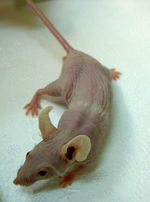Difference between revisions of "Category:Primary Immunodeficiency"
Jump to navigation
Jump to search
(Created page with "*Primary immunodeficiencies may affect either the innate immune system or the adaptive immune system *...") |
(No difference)
|
Revision as of 13:40, 12 August 2010
- Primary immunodeficiencies may affect either the innate immune system or the adaptive immune system
- They are categorised by either the type or the developmental stage of the cells involved
- Lymphoid cell disorders affect T cells or B cells (or both)
- Myeloid cell disorders affect phagocytic function
- The severity of the immunodeficiency depends on at which stage in development the problem occurs
- E.g. Defects early on in development will affect the entire immune system
- T cell deficiencies can affect both the cell-mediated and humoral response as T cells play a central role in the immune system
Deficiencies of Innate Immunity
Canine Cyclic Haematopoiesis
- Also called Grey Collie Syndrome
- Autosomal recessive
- Insertion mutation in AP3B1 gene
- Diluted grey coat colour, stunted growth, poor wound healing
- Neutropenia every 2 weeks which lasts 3-4 days due to cyclic production of cells from bone marrow
- Animals are prone to recurrent infections, mainly from the respiratory and gastrointestinal tract
- E.g. pyrexia, diarrhoea, gingivitis and arthritis
- Puppies can be distinguished from other litter mates by the diluted grey colouring
- Affected puppies show symptoms such as fever, joint pain and eye, skin and respiratory infections from 8 weeks of age
- Affected animals rarely live beyond 2-3 years with most puppies dying within a few weeks of birth
Canine Leukocyte Adhesion Deficiency (CLAD)
- Occurs in Irish Setters
- Missence mutation of -Cys-36-Ser- in CD18 molecule
- CD18 is required for neutrophil migration and phagocytosis
- Recurrent bacterial infection
- Neutrophilia (neutrophils remain in the blood and are unable to fight infection in the tissue)
Bovine Leukocyte Adhesion Deficiency (BLAD)
- Occurs in Holstein cattle
- Missence mutation of -Asp-128-Gly in CD18 molecule
- Recurrent infection, e.g. pneumonia
Deficiencies of Adaptive Immunity
Equine Severe Combined Immune Deficiency (Equine SCID)
- Autosomal recessive
- Occurs in 2-3% of Arabian foals
- Defect in DNA-dependent protein kinase gene
- Gene codes for a DNA repair enzyme involved in V(D)J recombination for antigen receptors of lymphocytes (e.g. Ig and TCR)
- No functional B cells or T cells
- Foals develop infections (usually around 8 weeks of age as maternal antibody in colostrum wanes around this time)
- Foals usually die from bronchopneumonia
Canine X-Linked Severe Combined Immune Deficiency (Canine SCID)
- Affects Basset Hounds and Corgis
- X-linked recessive defect in the gene coding for the IL-2 receptor
- IL-2 receptor is a receptor for the cytokine IL-2 which causes T cells to proliferate
- Causes lymphoid hypoplasia, stunted growth and increases the animal's susceptibility to infection
- Animal usually dies from pneumonia or sepsis as the level of maternal antibody decreases
Selective IgA deficiency of German Shepherd Dogs
- Poorly understood
- Linked to other disease syndromes such as deep pyoderma, inflammatory bowel disease, anal furunculosis and disseminated aspergillosis
- [[Immunoglobulin A|IgA]] deficiency so more susceptible to mucosal disease
Immunodeficiency of Weimaraners, Irish Wolfhounds and Miniature Dachshunds
- Unknown aetiology
- Inherited defects
- Low levels of circulating IgM and IgG
- Impaired neutrophil function
- Causes recurrent pyrexia and infections
Laboratory Examples of Severe Combined Deficiency
- Knock-out mice
- E.g. Gene coding for CD4, CD8, IL-10 removed
Subcategories
This category has the following 2 subcategories, out of 2 total.
Pages in category "Primary Immunodeficiency"
This category contains only the following page.

